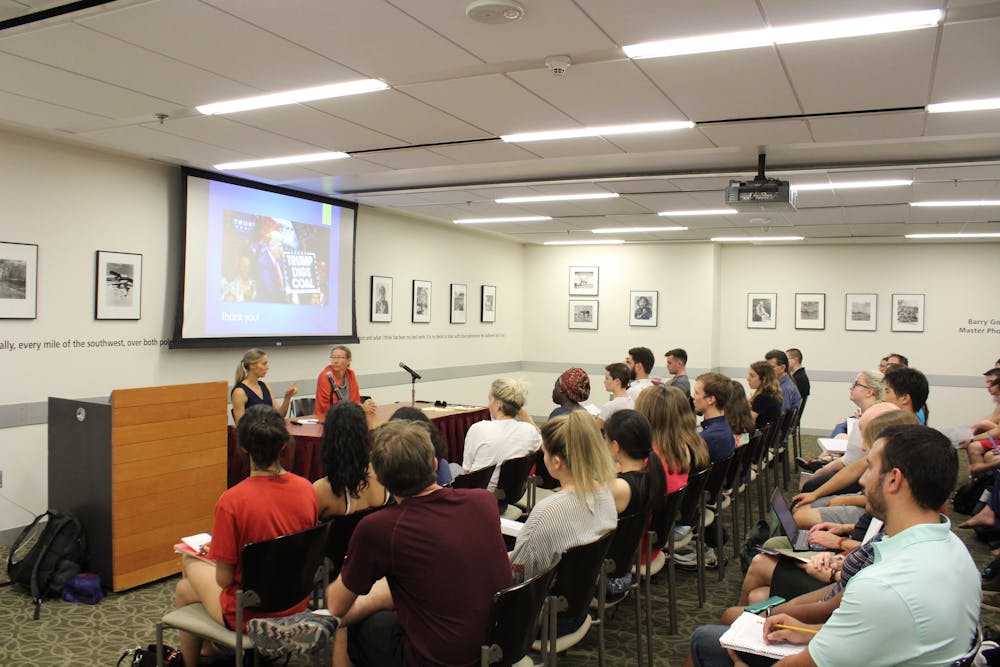Sonja Klinsky, an assistant professor in the School of Sustainability at ASU, and Manjana Milkoreit, an assistant professor in the Department of Political Science at Purdue University, led a panel on President Trump and his administration’s dealings with climate change.
The event lasted an hour and a half, during which the two gave a tag-team presentation and answered questions.
Milkoreit began by explaining the process of climate change, and then introduced the ways the Trump administration affects climate change decisions: foreign policy, power to direct funding, staffing, policy and the power to affect the way people think and talk about climate change.
They specifically addressed the Paris Agreement, the 2015 international accord amongst 195 countries to address climate change, from which President Trump withdrew the U.S. in June.
“The effects of climate change are likely to be worse given this loss of action within the United States,” Milkoreit said.
The pair spoke on political appointments and staffing, fossil fuel support in policy making, energy efficiency and changes in values.
“Climate change is very much a race against time, so the longer we wait to do something effectively, the heavier the toll on where our future coast lines will be, whether there will be forests in California and Washington, what kinds of species will actually make it through this century,” Milkoreit said.
Klinsky addressed the importance of how the president and his administration talk about climate change.
“How we talk and act shape certain ways we think about things and undermines other things," she said. "So think about the kind of language that President Trump uses and what ideas about science and climate change that reinforces and what ideas about science and climate change does that undermine.”
John Parker, an honors faculty fellow in Barrett, The Honors College, set up this event along with several others as part of his class “Science, Trumped.” In this upper division honors section course, Parker leads eight in-class sessions and hosts eight panel discussions where students dive into the relationship between the Trump administration and science.
Students from Parker's class, as well as students who simply care about the issue of climate change, attended the panel and asked questions.
One of the most common questions asked regarded individual responsibility in addressing climate change and what the students could do on a small scale to address the issue.
“At the moment," Milkoreit said, "given the political situation, I think what everybody can do is, engage politically, to actually speak about this stuff publicly, to vote for the right candidate, and ask your senators and representatives to do things that take this seriously and speak out and organize.”
Students from Parker’s class made up a large portion of the event’s attendees. One of these students was Alexa Rodriguez, a sophomore studying political science and Spanish.
“Especially with the election of Donald Trump, (climate change) has come more to the forefront because we do see talks about bringing coal mining jobs back, pulling out of the Paris Agreement," Rodriguez said. "I’m here because I care and I think it’s important to understand a lot of different parts of the issue so that you can meet people where they are … saying what people need to hear.”
Alex Davis, a "non-degree seeking masters student," was not taking Parker’s class, but attended the event out of personal interest and a desire to learn about the issue.
Klinsky drew a metaphor during the talk comparing sustainability to the “Boggart” from “Harry Potter,” a frightening figure that takes the form of what the person fears most.
“Towards the end (Klinsky) talked about how sustainability is this ever-changing Boggart from Harry Potter, how it’s the worst thing you want to see," Davis said. "So if big government is scary to you, sustainability is big government trying to control you … I thought that was a great way to frame sustainability in the academic side of things and pair that with the cultural individual discussion.”
Davis explains that it is important to take various perspectives into account when tackling such a complex issue.
“I think it’s really important that we don’t lean into this idea that everyone’s opinion is equally valid. There are people who have studied and who know more about certain things. I think that’s really important to take their guidance and listen to them and fact check them and move forward with an educated discussion,” Davis said.
Reach the reporter at madison.arnold.1@asu.edu or follow @madisonC_arnold on Twitter.
Like The State Press on Facebook and follow @statepress on Twitter.




